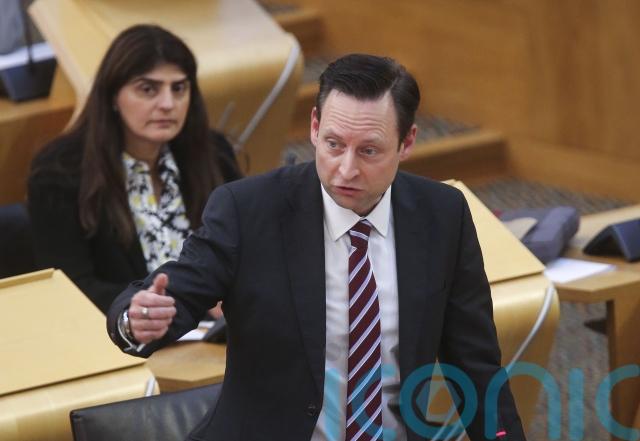
Teachers across Scotland are seeing a “significant amount of violence”, according to a new report, which says pupil violence has increased over the last four years.
Scotland’s largest teaching union, the Educational Institute of Scotland (EIS), published the findings of its survey of 875 schools, showing 82.7% of schools report violent or aggressive incidents each week.
Some 72% said the amount of violence and aggression from pupils has grown in the last four years.
Prejudice-based violence rose over the same period, according to 40% of respondents.
Physical violence towards a teacher was the most common type of violence and aggression in primary and special education, while verbal abuse was the most common in secondary schools.
Some 11% of schools said teachers felt supported by their employer after pupil-on-teacher violence, but 26.1% said teachers were not supported after violent and aggressive incidents.
Violent and aggressive behaviour from parents and carers is also on the rise, according to the report, with 50.5% of schools saying it was becoming more frequent.
Schools also reported a lack of time to deal with incidents, decompress, report the incident and properly engage with restorative practices.
National Survey of Teachers Lays Bare Scale of Violence Problem in Schools https://t.co/L9MYwIZpAm #EISNews pic.twitter.com/tnKpvhLe3Q
— EIS (@EISUnion) November 24, 2023
The union’s general secretary Andrea Bradley said “lingering policies of austerity and the continuing scourge of poverty” combined to “create a society where many young people feel alienated, isolated and distressed”.
She said: “For a small but growing minority, this is increasingly manifesting itself in unruly, disruptive or violent behaviour, including during the school day and aimed at staff or other pupils.”
Staff also criticised the lack of resources, training, local authority support and access to associated professionals,
As a result of the increase in pupil violence and aggression, almost all schools surveyed said it was having a negative impact on pupil learning, with 99.8% indicating that teaching and learning was disrupted and 96.6% reporting it was difficult to maintain or regain pupils’ attention.
Almost all schools who responded reported an increase in stress, anxiety and depression for some teachers in their school, with 78.5% reporting some teachers are scared of certain pupils.
Some 75.4% of schools reported a staff member being physical injured.
Some 79% of schools reported that teachers had considered leaving the profession as a result of the rise in violence and aggression towards them.
Ms Bradley said violence and aggression in schools is a “serious and growing problem”.

She added: “This must be treated seriously, and tackled quickly, by the Scottish Government and local authorities to ensure that school pupils and staff can feel safe and be safe in our schools.
“Successive governments – both at Westminster and Holyrood – have failed to sufficiently prioritise the needs of young people, leaving many pupils in our schools struggling to cope with the many challenges they face in their everyday lives.”
Ms Bradley called for further support and resources to be given to schools to help mitigate against challenges faced by young people in their daily lives.
The EIS launched its Stand Up For Quality Education campaign earlier this year to address challenges schools continue to face.
Ms Bradley wants more teachers and support staff to be recruited to tackle “crippling” workloads and emotional pressure on teachers, which she said present a “health and safety risk”.
She added: “Our young people, and all those working in our schools, have the right to expect action to address the challenges identified in our report.

“Put simply, education shouldn’t hurt.”
Earlier this month, a similar report was published by Unison, showing a 31% increase in violent incidents reported by public sector bodies such as local authorities.
The majority of incidents at local authority level were towards school support staff.
Scottish Conservative education spokesman Liam Kerr said: “These shocking findings expose how violence in our schools has spiralled on the SNP’s watch.
“No pupil or member of staff should fear violence in our schools, but SNP ministers have been asleep at the wheel in tackling this widespread issue.
“It was only following repeated pressure from the Scottish Conservatives that the SNP finally convened summits on school violence.
“But months on, teachers still have no roadmap, no guidance, no solutions and, as usual with the SNP, no meaningful outcomes.
“The fact is, robust action must be taken against those who carry out acts of violence in our schools, and our hardworking teachers must have every resource they need to tackle these problems.”
A Cosla spokesperson said: “Councils take the issue of safety in schools extremely seriously, and we are clear that the safety and wellbeing is of paramount importance.
“Schools must be safe and welcoming places for children, young people and staff.
“All councils will have reporting mechanisms in place for recording incidents, and we have recognised recent findings from Education Scotland’s thematic inspection on bullying.
“This is an issue which is considered regularly at the Scottish Advisory Group on Relationships and Behaviour in Schools, which is co-chaired by Cosla and the Scottish Government.
“We have taken part in a series of Scottish Government summits with partners and stakeholders to consider these issues further, with the third summit taking place next week.”
Scotland’s Education Secretary Jenny Gilruth said: “Since my appointment as Education Secretary, I’ve been clear on the importance of improving behaviour and relationships in schools, which is why I am bringing together teachers, parents, local authority representatives, unions and other stakeholders to discuss these issues and develop a series of actions.
“The third summit on behaviour and relationships in schools will take place next week and will coincide with publication of the Behaviour in Scottish Schools Research.
“We have commissioned this research to provide a robust national picture in relation to behaviour in Scotland’s schools.
“My aim is that, in partnership with the profession and local authority partners, we’ll be able to come to a set of conclusions focused on the practical action needed to make progress – and I am very grateful to everyone who has engaged so positively in the process so far.”
Subscribe or register today to discover more from DonegalLive.ie
Buy the e-paper of the Donegal Democrat, Donegal People's Press, Donegal Post and Inish Times here for instant access to Donegal's premier news titles.
Keep up with the latest news from Donegal with our daily newsletter featuring the most important stories of the day delivered to your inbox every evening at 5pm.